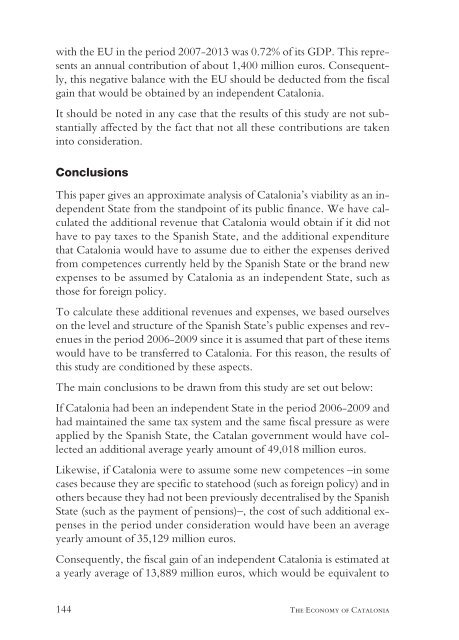The Economy of Catalonia
the_economy_of_catalonia._questions_and_answers_on_the_economic_impact_of_independence
the_economy_of_catalonia._questions_and_answers_on_the_economic_impact_of_independence
You also want an ePaper? Increase the reach of your titles
YUMPU automatically turns print PDFs into web optimized ePapers that Google loves.
with the EU in the period 2007-2013 was 0.72% <strong>of</strong> its GDP. This represents<br />
an annual contribution <strong>of</strong> about 1,400 million euros. Consequently,<br />
this negative balance with the EU should be deducted from the fiscal<br />
gain that would be obtained by an independent <strong>Catalonia</strong>.<br />
It should be noted in any case that the results <strong>of</strong> this study are not substantially<br />
affected by the fact that not all these contributions are taken<br />
into consideration.<br />
Conclusions<br />
This paper gives an approximate analysis <strong>of</strong> <strong>Catalonia</strong>’s viability as an independent<br />
State from the standpoint <strong>of</strong> its public finance. We have calculated<br />
the additional revenue that <strong>Catalonia</strong> would obtain if it did not<br />
have to pay taxes to the Spanish State, and the additional expenditure<br />
that <strong>Catalonia</strong> would have to assume due to either the expenses derived<br />
from competences currently held by the Spanish State or the brand new<br />
expenses to be assumed by <strong>Catalonia</strong> as an independent State, such as<br />
those for foreign policy.<br />
To calculate these additional revenues and expenses, we based ourselves<br />
on the level and structure <strong>of</strong> the Spanish State’s public expenses and revenues<br />
in the period 2006-2009 since it is assumed that part <strong>of</strong> these items<br />
would have to be transferred to <strong>Catalonia</strong>. For this reason, the results <strong>of</strong><br />
this study are conditioned by these aspects.<br />
<strong>The</strong> main conclusions to be drawn from this study are set out below:<br />
If <strong>Catalonia</strong> had been an independent State in the period 2006-2009 and<br />
had maintained the same tax system and the same fiscal pressure as were<br />
applied by the Spanish State, the Catalan government would have collected<br />
an additional average yearly amount <strong>of</strong> 49,018 million euros.<br />
Likewise, if <strong>Catalonia</strong> were to assume some new competences –in some<br />
cases because they are specific to statehood (such as foreign policy) and in<br />
others because they had not been previously decentralised by the Spanish<br />
State (such as the payment <strong>of</strong> pensions)–, the cost <strong>of</strong> such additional expenses<br />
in the period under consideration would have been an average<br />
yearly amount <strong>of</strong> 35,129 million euros.<br />
Consequently, the fiscal gain <strong>of</strong> an independent <strong>Catalonia</strong> is estimated at<br />
a yearly average <strong>of</strong> 13,889 million euros, which would be equivalent to<br />
144 <strong>The</strong> <strong>Economy</strong> <strong>of</strong> <strong>Catalonia</strong>


